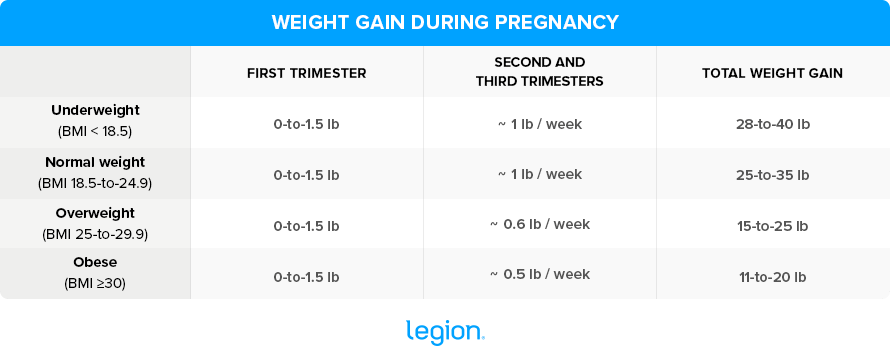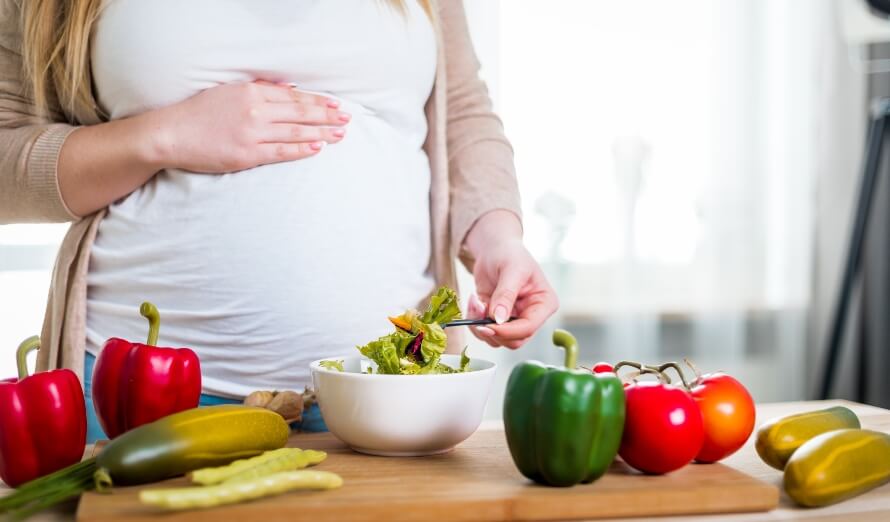You’re moody. Careworn. Hungry. And when you’re like many ladies, most likely apprehensive about gaining an excessive amount of weight.
The trials and tribulations of being pregnant. 🙃
What’s extra, you’re additionally overwhelmed by myriad conflicting opinions over what, how a lot, and when it is best to eat to take care of a wholesome weight, keep glad, and nourish your rising child.
A easy resolution to most of those issues is to create a being pregnant meal plan. Not solely does this make it simpler to eat healthily throughout being pregnant, it additionally helps you keep away from the postpartum weight acquire that torments many new moms.
On this article you’ll study what a wholesome being pregnant meal plan is, why it is best to observe one, what to incorporate in a meal plan for pregnant girls, and an instance of a weekly being pregnant meal plan.
What Is a Being pregnant Meal Plan?
A “meal plan” is a doc that tells you precisely what and the way a lot you’ll eat for each meal over a time period, often a single day.
A “being pregnant meal plan” is much like an everyday meal plan besides that the meals decisions and quantities are optimized for a pregnant mom. That’s, a being pregnant meal plan carefully regulates the variety of energy, amount of every macronutrient, and sorts of meals you eat to make sure you and your youngster are as wholesome as doable.
Being pregnant meal plans are helpful as a result of many ladies discover that the stress and cravings accompanying being pregnant drive them to overeat and make unhealthy meals decisions, particularly after they must resolve what to eat on the fly.
A being pregnant meal plan means that you can plan and prep your meals forward of time, which minimizes the temptation to pig out on junk meals and ensures that you simply eat well-balanced meals to advertise a wholesome being pregnant.
Discover the Finest Weight loss plan for You in Simply 60 Seconds
What number of energy do you have to eat? What about “macros?” What meals do you have to eat? Take our 60-second quiz to get science-based solutions to those questions and extra.
Take the Quiz
Why Ought to I Observe a Wholesome Being pregnant Meal Plan?
Gaining some weight throughout being pregnant is important: it ensures your physique has sufficient saved power to help the wholesome growth of your youngster.
Nonetheless, extreme “gestational weight gain” (weight acquire throughout being pregnant) increases your danger of experiencing pregnancy- and labor-related issues, together with hypertension, preeclampsia, gestational diabetes, and C-section.
(That is significantly pertinent for ladies who start being pregnant chubby [BMI ≥ 25] or overweight [BMI ≥ 30] since they’re extra more likely to gain extra weight throughout being pregnant.)
It may well additionally make returning to a wholesome weight after you give start tougher. Research reveals that girls who acquire extreme weight throughout being pregnant usually discover it tough to shake the additional weight even years after they offer start.
Following a being pregnant meal plan helps you sidestep the well being woes and weight struggles related to extreme gestational weight acquire as a result of it makes regulating the variety of energy and sorts of meals you eat simpler. It additionally ensures that you simply eat ample nutritional vitamins, minerals, and different micronutrients, which research shows is a boon to the well being of your child.
In different phrases, following a being pregnant meal plan is an efficient technique to assure you and your child keep as wholesome as doable throughout and after the start.
The Finest Meal Plan for Pregnant Ladies
Each lady’s dietary wants throughout being pregnant are totally different, which is why it’s a good suggestion to speak with a health care provider or registered dietician earlier than you decide to any being pregnant meal plan. That mentioned, listed here are some strong “first rules” that work properly for most individuals.
(And when you’d like much more particular recommendation about what number of energy, how a lot of every macronutrient, and which meals it is best to eat to succeed in a wholesome weight earlier than you get pregnant or keep a wholesome weight when you’re pregnant, take the Legion Weight loss plan Quiz.)
Energy
You don’t want to extend your calorie consumption in the course of the first trimester of being pregnant (the primary 12 weeks). Throughout the second and third trimesters, nevertheless, you’ll must eat barely extra to fulfill your rising child’s wants.
(Observe: It’s finest to keep away from a calorie deficit throughout being pregnant as a result of there isn’t ample evidence to point out that it isn’t a danger to your child. It is likely to be nice or it won’t, so it’s higher to play it secure and eat sufficient to take care of your weight.)
To find out what number of energy it is best to eat throughout every trimester, you first have to find out your whole day by day power expenditure (TDEE), which is a mathematical estimate of what number of whole energy you burn all through the day primarily based in your weight, top, age, and exercise degree.
One of the best ways to calculate your TDEE is to make use of the calculator right here.
After calculating your TDEE, you can work out your calorie necessities for every trimester utilizing this desk:

Protein
Protein is important for sustaining muscle mass and supporting fetal growth, and your physique’s demand for protein will increase if you’re pregnant (particularly over the last two trimesters).
Protein is also highly satiating, which implies it helps you are feeling extra glad by your meals. Consequently, you’re much less more likely to overeat and expertise extreme weight acquire throughout being pregnant.
Consuming a moderate- to high-protein weight-reduction plan throughout being pregnant is a double-edged sword, although: whereas consuming sufficient protein is wholesome for you and your child, consuming an excessive amount of might impair fetal growth.
Thus, the “candy spot” for many pregnant girls is to get roughly 20% of their day by day energy from protein, which works out to round 0.8 grams of protein per pound of body weight for most individuals.
Research shows this is sufficient to hold you and your child wholesome, however properly under the extent that may put your child in danger.
Some wholesome high-protein meals to incorporate in your meal plan whereas pregnant are . . .
- Lean meats, comparable to sirloin steak, hen breast, and pork loin
- Low-mercury fish, comparable to anchovies, herring, mackerel, salmon, sardines, tilapia, trout, and char
- Plant-based protein sources, comparable to beans and legumes, soy, and seitan
- Dairy merchandise, comparable to Greek yogurt, cheese, cottage cheese, and milk
- Eggs
Carbohydrates
Your physique breaks down the carbs you eat into glucose (blood sugar), which is your physique’s major supply of power.
To support the fast development of your youngster throughout being pregnant, your physique’s demand for power will increase, which implies you must enhance the quantity of carbs you eat, too.
To make sure you hit your physique’s power calls for throughout being pregnant, research reveals that it is best to intention to get 45-to-60% of your day by day energy from carbs.
The place doable, go for low-GI, high-fiber carbs comparable to oats, rice, and grains; entire wheat bread and pasta; non-starchy greens like bell peppers, broccoli, and eggplant; and seeds, lentils, beans, and legumes.
Research shows these meals aid you keep steady blood sugar ranges and a wholesome weight throughout being pregnant, and lower your danger of preeclampsia.
Fats
There are 4 broad classes of dietary fats: monounsaturated fats, polyunsaturated fats, saturated fats, and trans fats.
Analysis reveals that consuming enough ranges of monounsaturated and polyunsaturated fats (significantly omega-3 fatty acids) throughout being pregnant is important for fetal growth and minimizing the chance of start issues. Particularly, it . . .
- Supports fetal mind, eye, and nervous system growth
- Supports the event of the placenta
- Reduces the chance of preterm start
- Reduces the chance of the kid being born small for his or her gestational age
- Reduces the chance of pre- and postnatal despair
- May cut back the chance of preeclampsia
Alternatively, consuming giant quantities of saturated fats and trans fats throughout being pregnant is related to issues each earlier than and after the start, together with an elevated danger of . . .
For these causes, research reveals that it is best to get the remaining 20-to-35% of your day by day energy from fats, however that lower than 10% ought to come from saturated or trans fats.
The most effective sources of omega-3 fatty acids to incorporate in your being pregnant meal plan are low-mercury fatty fish comparable to wild Alaskan salmon, char, Atlantic mackerel, and sardines.
And when you’re not keen on consuming fish, get not less than 400 mg of EPA and DHA per day from a complement comparable to fish oil as a substitute. (For those who’re on the lookout for a supply of 100% pure, high-potency, molecularly distilled fish oil, try Triton).
An Instance Weekly Being pregnant Meal Plan
Right here’s an instance of a wholesome weekly being pregnant meal plan. Remember the fact that that is an instance and that your calorie and macronutrient necessities will possible differ.
(And once more, when you’d like particular recommendation about what number of energy, how a lot of every macronutrient, and which meals it is best to eat to succeed in a wholesome weight earlier than you’re pregnant or keep a wholesome weight when you’re pregnant, take the Legion Weight loss plan Quiz.)
Sunday:
Monday (vegan):
Tuesday:
Wednesday:
Thursday:
Friday:
Saturday:
FAQ #1: How a lot weight ought to I acquire throughout being pregnant?
The quantity of weight it is best to acquire throughout being pregnant depends upon which trimester you’re in and your beginning BMI. Listed here are some tips that work for most individuals:

That mentioned, some studies suggests that girls who’re overweight ought to intention to achieve even lower than this.
Particularly, researchers suggest the next weight acquire targets for ladies who’re overweight:
- 30-to-34.9 BMI = 5.5-to-15 kilos of weight acquire
- 35-to-39.9 BMI = 9.9 kilos or much less of weight acquire
- 40 BMI or greater = no weight acquire
FAQ #2: Can I observe a vegetarian being pregnant meal plan?
Sure, you’ll be able to observe a vegetarian being pregnant meal plan.
Whereas not essentially optimum, you’ll be able to have a superbly wholesome being pregnant as a vegetarian so long as you ensure you meet your dietary necessities for protein, omega-3 fatty acids, zinc, iodine, calcium, vitamin D, and vitamin B12.
Listed here are some suggestions that’ll aid you do exactly that:
- Protein: Plant-based protein sources are less well-absorbed by the physique and have weaker amino acid profiles than animal protein sources. You’ll be able to largely overcome these shortcomings by combining plant-based protein sources in your meals (rice and beans, for instance) and utilizing a high quality vegan protein powder (comparable to Plant+).
- Omega-3 Fatty Acids: Whereas some fatty acids are present in vegetation, they’re not simply transformed into the sorts of fatty acids that confer well being advantages in pregnant girls. The simplest technique to get round that is by supplementing with fish or algae oil. If you need a high-potency, molecularly distilled fish oil, strive Triton.
- Zinc: Zinc is considerable in meals comparable to legumes, soy, nuts, seeds, and grains, so you’ll want to embrace loads of these in your being pregnant meal plan. (For those who’d wish to hold your zinc ranges topped off, strive Triumph for ladies. It’s a 100% pure sport multivitamin that comprises 30 mg of zinc together with 32 different substances to boost well being, efficiency, and temper; and cut back stress, fatigue, and anxiousness.)
- Iodine: To extend your iodine consumption, add seaweed to recipes like omelets, stir-fry dishes, and soups, season your meals with iodized salt as a substitute of normal desk salt, or take Triumph for ladies, which comprises 225 mcg of iodine.
- Calcium: There are a lot of vegetarian-friendly low-fat dairy merchandise that’ll aid you hit your calcium goal, comparable to skyr, Greek yogurt, and cottage cheese created from pasteurized milk.
- Vitamin D: One of the best ways to maintain your D ranges topped off is to spend time outdoor within the solar and to take a vitamin D complement like Triumph for ladies that comprises 2,000 IU of D per day.
- Vitamin B12: There aren’t any plant sources of B12, so that you’ll have to complement with the intention to keep away from a deficiency. (Triumph for ladies additionally comprises 600 mcg of vitamin B12).
FAQ #3: Can I observe a vegan being pregnant meal plan?
Sure, you’ll be able to follow a vegan being pregnant meal plan when you’re diligent about your dietary consumption. The above suggestions for vegetarians additionally apply for vegans.
Nonetheless, as a result of assembly your protein wants will possible be much more tough, a plant-based protein powder is likely to be needed.
Moreover, since your weight-reduction plan additionally excludes dairy, you’ll need to up your consumption of leafy, inexperienced greens like bok choy, collard greens, and kale to fulfill your calcium necessities.
FAQ #4: Ought to I observe a being pregnant weight-reduction plan meal plan?
Following a meal plan throughout being pregnant might help you meet your macronutrient and micronutrient wants whereas avoiding extreme gestational weight acquire.
It’s price noting, although, that there isn’t ample proof to warrant calorie restriction throughout being pregnant, as it might jeopardize the well being of your child. For those who’re overweight and contemplating weight-reduction plan whereas pregnant, speak along with your physician to debate the most effective plan of action. Basically, you’ll most likely need to attain a wholesome weight earlier than you get pregnant.
FAQ #5: Can I begin weight-reduction plan after giving start?
There isn’t sufficient analysis to know for certain whether or not weight-reduction plan postpartum (after giving start) is totally with out danger, although most of the research we at present have means that proscribing your energy postpartum is secure supplied you aren’t underweight or malnourished and eat a nutritious diet that’s wealthy in nutritional vitamins and minerals.
That mentioned, there are a number of elements that it is best to take into account earlier than you begin weight-reduction plan postpartum.
For instance, a number of muscular tissues comparable to your abdominals have to get well after giving start. Research reveals that consuming in a calorie deficit impairs your physique’s means to restore muscle tissue, which might elongate your post-birth restoration.
What’s extra, breastfeeding increases calorie calls for by as much as 500 energy per day. For those who don’t issue this into your weight-reduction plan, it’s possible you’ll reduce the amount and high quality of your breastmilk, which might have destructive repercussions to your child.
Additionally keep in mind that breastfeeding moms tend to lose weight as a matter after all. Thus, when you resolve to breastfeed, there’s an excellent likelihood you’ll shed weight with out the necessity to weight-reduction plan.
+ Scientific References
- Asefa, F., & Nemomsa, D. (2016). Gestational weight gain and its associated factors in Harari Regional State: Institution based cross-sectional study, Eastern Ethiopia. Reproductive Health, 13(1), 1–7. https://doi.org/10.1186/S12978-016-0225-X/TABLES/5
- Wang, L., Zhang, X., Chen, T., Tao, J., Gao, Y., Cai, L., Chen, H., & Yu, C. (2021). Association of Gestational Weight Gain With Infant Morbidity and Mortality in the United States. JAMA Network Open, 4(12), e2141498–e2141498. https://doi.org/10.1001/JAMANETWORKOPEN.2021.41498
- Asefa, F., Cummins, A., Dessie, Y., Hayen, A., & Foureur, M. (2020). Gestational weight gain and its effect on birth outcomes in sub-Saharan Africa: Systematic review and meta-analysis. PLOS ONE, 15(4), e0231889. https://doi.org/10.1371/JOURNAL.PONE.0231889
- Kominiarek, M. A., & Peaceman, A. M. (2017). Gestational Weight Gain. American Journal of Obstetrics and Gynecology, 217(6), 642. https://doi.org/10.1016/J.AJOG.2017.05.040
- Artal, R., Catanzaro, R. B., Gavard, J. A., Mostello, D. J., & Friganza, J. C. (2007). A lifestyle intervention of weight-gain restriction: diet and exercise in obese women with gestational diabetes mellitus. Applied Physiology, Nutrition, and Metabolism = Physiologie Appliquee, Nutrition et Metabolisme, 32(3), 596–601. https://doi.org/10.1139/H07-024
- Davis, A. M. (2015). Pandemic of Pregnant Obese Women: Is It Time to Re-Evaluate Antenatal Weight Loss? Healthcare, 3(3), 733. https://doi.org/10.3390/HEALTHCARE3030733
- Nuttall, F. Q. (2015). Body Mass Index: Obesity, BMI, and Health: A Critical Review. Nutrition Today, 50(3), 117. https://doi.org/10.1097/NT.0000000000000092
- Deputy, N. P., Sharma, A. J., Kim, S. Y., & Hinkle, S. N. (2015). Prevalence and Characteristics Associated With Gestational Weight Gain Adequacy. Obstetrics and Gynecology, 125(4), 773. https://doi.org/10.1097/AOG.0000000000000739
- Nehring, I., Schmoll, S., Beyerlein, A., Hauner, H., & Von Kries, R. (2011). Gestational weight gain and long-term postpartum weight retention: a meta-analysis. The American Journal of Clinical Nutrition, 94(5), 1225–1231. https://doi.org/10.3945/AJCN.111.015289
- Borge, T. C., Aase, H., Brantsæter, A. L., & Biele, G. (2017). The importance of maternal diet quality during pregnancy on cognitive and behavioural outcomes in children: a systematic review and meta-analysis. BMJ Open, 7(9). https://doi.org/10.1136/BMJOPEN-2017-016777
- Blomberg, M. (2011). Maternal and neonatal outcomes among obese women with weight gain below the new Institute of Medicine recommendations. Obstetrics and Gynecology, 117(5), 1065–1070. https://doi.org/10.1097/AOG.0B013E318214F1D1
- Weight Gain During Pregnancy | Pregnancy | Maternal and Infant Health | CDC. (n.d.). Retrieved March 9, 2022, from https://www.cdc.gov/reproductivehealth/maternalinfanthealth/pregnancy-weight-gain.htm#trackers
- Parrettini, S., Caroli, A., & Torlone, E. (2020). Nutrition and Metabolic Adaptations in Physiological and Complicated Pregnancy: Focus on Obesity and Gestational Diabetes. Frontiers in Endocrinology, 11, 937. https://doi.org/10.3389/FENDO.2020.611929/BIBTEX
- Koletzko, B., Godfrey, K. M., Poston, L., Szajewska, H., Van Goudoever, J. B., De Waard, M., Brands, B., Grivell, R. M., Deussen, A. R., Dodd, J. M., Patro-Golab, B., & Zalewski, B. M. (2019). Nutrition During Pregnancy, Lactation and Early Childhood and its Implications for Maternal and Long-Term Child Health: The Early Nutrition Project Recommendations. Annals of Nutrition & Metabolism, 74(2), 93–106. https://doi.org/10.1159/000496471
- Weigle, D. S., Breen, P. A., Matthys, C. C., Callahan, H. S., Meeuws, K. E., Burden, V. R., & Purnell, J. Q. (2005). A high-protein diet induces sustained reductions in appetite, ad libitum caloric intake, and body weight despite compensatory changes in diurnal plasma leptin and ghrelin concentrations. The American Journal of Clinical Nutrition, 82(1), 41–48. https://doi.org/10.1093/AJCN.82.1.41
- Westerterp-Plantenga, M. S. (2003). The significance of protein in food intake and body weight regulation. Current Opinion in Clinical Nutrition and Metabolic Care, 6(6), 635–638. https://doi.org/10.1097/00075197-200311000-00005
- Ortinau, L. C., Hoertel, H. A., Douglas, S. M., & Leidy, H. J. (2014). Effects of high-protein vs. high- fat snacks on appetite control, satiety, and eating initiation in healthy women. Nutrition Journal, 13(1). https://doi.org/10.1186/1475-2891-13-97
- Herring, C. M., Bazer, F. W., Johnson, G. A., & Wu, G. (2018). Impacts of maternal dietary protein intake on fetal survival, growth, and development. Experimental Biology and Medicine, 243(6), 525. https://doi.org/10.1177/1535370218758275
- Kominiarek, M. A., & Rajan, P. (2016). Nutrition Recommendations in Pregnancy and Lactation. The Medical Clinics of North America, 100(6), 1199. https://doi.org/10.1016/J.MCNA.2016.06.004
- Mousa, A., Naqash, A., & Lim, S. (2019). Macronutrient and Micronutrient Intake during Pregnancy: An Overview of Recent Evidence. Nutrients, 11(2). https://doi.org/10.3390/NU11020443
- Hull, H. R., Herman, A., Gibbs, H., Gajewski, B., Krase, K., Carlson, S. E., Sullivan, D. K., & Goetz, J. (2020). The effect of high dietary fiber intake on gestational weight gain, fat accrual, and postpartum weight retention: A randomized clinical trial. BMC Pregnancy and Childbirth, 20(1), 1–10. https://doi.org/10.1186/S12884-020-03016-5/TABLES/5
- Coletta, J. M., Bell, S. J., & Roman, A. S. (2010). Omega-3 Fatty Acids and Pregnancy. Reviews in Obstetrics and Gynecology, 3(4), 163. https://doi.org/10.3909/riog0137
- Duttaroy, A. K., & Basak, S. (2020). Maternal dietary fatty acids and their roles in human placental development. Prostaglandins, Leukotrienes and Essential Fatty Acids, 155. https://doi.org/10.1016/J.PLEFA.2020.102080
- De Seymour, J. V., Simmonds, L. A., Gould, J., Makrides, M., & Middleton, P. (2019). Omega-3 fatty acids to prevent preterm birth: Australian pregnant women’s preterm birth awareness and intentions to increase omega-3 fatty acid intake. Nutrition Journal, 18(1), 1–6. https://doi.org/10.1186/S12937-019-0499-2/TABLES/4
- Martínez-Galiano, J. M., Olmedo-Requena, R., Barrios-Rodríguez, R., Amezcua-Prieto, C., Bueno-Cavanillas, A., Salcedo-Bellido, I., Jimenez-Moleon, J. J., & Delgado-Rodríguez, M. (2018). Effect of Adherence to a Mediterranean Diet and Olive Oil Intake during Pregnancy on Risk of Small for Gestational Age Infants. Nutrients, 10(9). https://doi.org/10.3390/NU10091234
- Oken, E., Ning, Y., Rifas-Shiman, S. L., Rich-Edwards, J. W., Olsen, S. F., & Gillman, M. W. (2007). Diet during pregnancy and risk of preeclampsia or gestational hypertension. Annals of Epidemiology, 17(9), 663–668. https://doi.org/10.1016/J.ANNEPIDEM.2007.03.003
- Spracklen, C. N., Smith, C. J., Saftlas, A. F., Robinson, J. G., & Ryckman, K. K. (2014). Maternal hyperlipidemia and the risk of preeclampsia: a meta-analysis. American Journal of Epidemiology, 180(4), 346–358. https://doi.org/10.1093/AJE/KWU145
- Jin, W. Y., Lin, S. L., Hou, R. L., Chen, X. Y., Han, T., Jin, Y., Tang, L., Zhu, Z. W., & Zhao, Z. Y. (2016). Associations between maternal lipid profile and pregnancy complications and perinatal outcomes: A population-based study from China. BMC Pregnancy and Childbirth, 16(1), 1–9. https://doi.org/10.1186/S12884-016-0852-9/TABLES/5
- Sullivan, E. L., Nousen, E. K., & Chamlou, K. A. (2014). Maternal high fat diet consumption during the perinatal period programs offspring behavior. Physiology & Behavior, 123, 236–242. https://doi.org/10.1016/J.PHYSBEH.2012.07.014
- Mennitti, L. V., Oliveira, J. L., Morais, C. A., Estadella, D., Oyama, L. M., Oller do Nascimento, C. M., & Pisani, L. P. (2015). Type of fatty acids in maternal diets during pregnancy and/or lactation and metabolic consequences of the offspring. The Journal of Nutritional Biochemistry, 26(2), 99–111. https://doi.org/10.1016/J.JNUTBIO.2014.10.001
- Vrijkotte, T. G. M., Krukziener, N., Hutten, B. A., Vollebregt, K. C., Van Eijsden, M., & Twickler, M. B. (2012). Maternal lipid profile during early pregnancy and pregnancy complications and outcomes: the ABCD study. The Journal of Clinical Endocrinology and Metabolism, 97(11), 3917–3925. https://doi.org/10.1210/JC.2012-1295
- Koletzko, B., Lien, E., Agostoni, C., Böhles, H., Campoy, C., Cetin, I., Decsi, T., Dudenhausen, J. W., Dupont, C., Forsyth, S., Hoesli, I., Holzgreve, W., Lapillonne, A., Putet, G., Secher, N. J., Symonds, M., Szajewska, H., Willatts, P., & Uauy, R. (2008). The roles of long-chain polyunsaturated fatty acids in pregnancy, lactation and infancy: review of current knowledge and consensus recommendations. Journal of Perinatal Medicine, 36(1), 5–14. https://doi.org/10.1515/JPM.2008.001
- Koletzko, B., Godfrey, K. M., Poston, L., Szajewska, H., Van Goudoever, J. B., De Waard, M., Brands, B., Grivell, R. M., Deussen, A. R., Dodd, J. M., Patro-Golab, B., & Zalewski, B. M. (2019). Nutrition During Pregnancy, Lactation and Early Childhood and its Implications for Maternal and Long-Term Child Health: The Early Nutrition Project Recommendations. Annals of Nutrition and Metabolism, 74(2), 93–106. https://doi.org/10.1159/000496471
- Parrettini, S., Caroli, A., & Torlone, E. (2020). Diet and Metabolic Variations in Physiological and Difficult Being pregnant: Deal with Weight problems and Gestational Diabetes. Frontiers in Endocrinology, 11, 937. https://doi.org/10.3389/FENDO.2020.611929/BIBTEX
- Sebastiani, G., Barbero, A. H., Borrás-Novel, C., Casanova, M. A., Aldecoa-Bilbao, V., Andreu-Fernández, V., Tutusaus, M. P., Martínez, S. F., Roig, M. D. G., & García-Algar, O. (2019). The Effects of Vegetarian and Vegan Diet during Pregnancy on the Health of Mothers and Offspring. Nutrients, 11(3). https://doi.org/10.3390/NU11030557
- van Vliet, S., Burd, N. A., & van Loon, L. J. C. (2015). The Skeletal Muscle Anabolic Response to Plant- versus Animal-Based Protein Consumption. The Journal of Nutrition, 145(9), 1981–1991. https://doi.org/10.3945/JN.114.204305
- Kimball, S. R., & Jefferson, L. S. (2006). Signaling pathways and molecular mechanisms through which branched-chain amino acids mediate translational control of protein synthesis. The Journal of Nutrition, 136(1 Suppl). https://doi.org/10.1093/JN/136.1.227S
- Sebastiani, G., Barbero, A. H., Borrás-Novel, C., Casanova, M. A., Aldecoa-Bilbao, V., Andreu-Fernández, V., Tutusaus, M. P., Martínez, S. F., Roig, M. D. G., & García-Algar, O. (2019). The Effects of Vegetarian and Vegan Diet during Pregnancy on the Health of Mothers and Offspring. Nutrients, 11(3). https://doi.org/10.3390/NU11030557
- Dusdieker, L. B., Hemingway, D. L., & Stumbo, P. J. (1994). Is milk production impaired by dieting during lactation? The American Journal of Clinical Nutrition, 59(4), 833–840. https://doi.org/10.1093/AJCN/59.4.833
- Mohammad, M. A., Sunehag, A. L., & Haymond, M. W. (2009). Effect of dietary macronutrient composition under moderate hypocaloric intake on maternal adaptation during lactation. The American Journal of Clinical Nutrition, 89(6), 1821. https://doi.org/10.3945/AJCN.2008.26877
- Fukano, M., Tsukahara, Y., Takei, S., Nose-Ogura, S., Fujii, T., & Torii, S. (2021). Recovery of Abdominal Muscle Thickness and Contractile Function in Women after Childbirth. International Journal of Environmental Research and Public Health, 18(4), 1–9. https://doi.org/10.3390/IJERPH18042130
- Berihun, S., Kassa, G. M., & Teshome, M. (2017). Factors associated with underweight among lactating women in Womberma woreda, Northwest Ethiopia; A cross-sectional study. BMC Nutrition, 3(1), 1–7. https://doi.org/10.1186/S40795-017-0165-Z/TABLES/4
- Jarlenski, M. P., Bennett, W. L., Bleich, S. N., Barry, C. L., & Stuart, E. A. (2014). Effects of breastfeeding on postpartum weight loss among U.S. women. Preventive Medicine, 69, 146. https://doi.org/10.1016/J.YPMED.2014.09.018
- Sámano, R., Martínez-Rojano, H., Martínez, E. G., Jiménez, B. S., Rodríguez, G. P. V., Zamora, J. P., & Casanueva, E. (2013). Effects of breastfeeding on weight loss and recovery of pregestational weight in adolescent and adult mothers. Food and Nutrition Bulletin, 34(2), 123–130. https://doi.org/10.1177/156482651303400201
- Janney, C. A., Zhang, D., & Sowers, M. (1997). Lactation and weight retention. The American Journal of Clinical Nutrition, 66(5), 1116–1124. https://doi.org/10.1093/AJCN/66.5.1116












